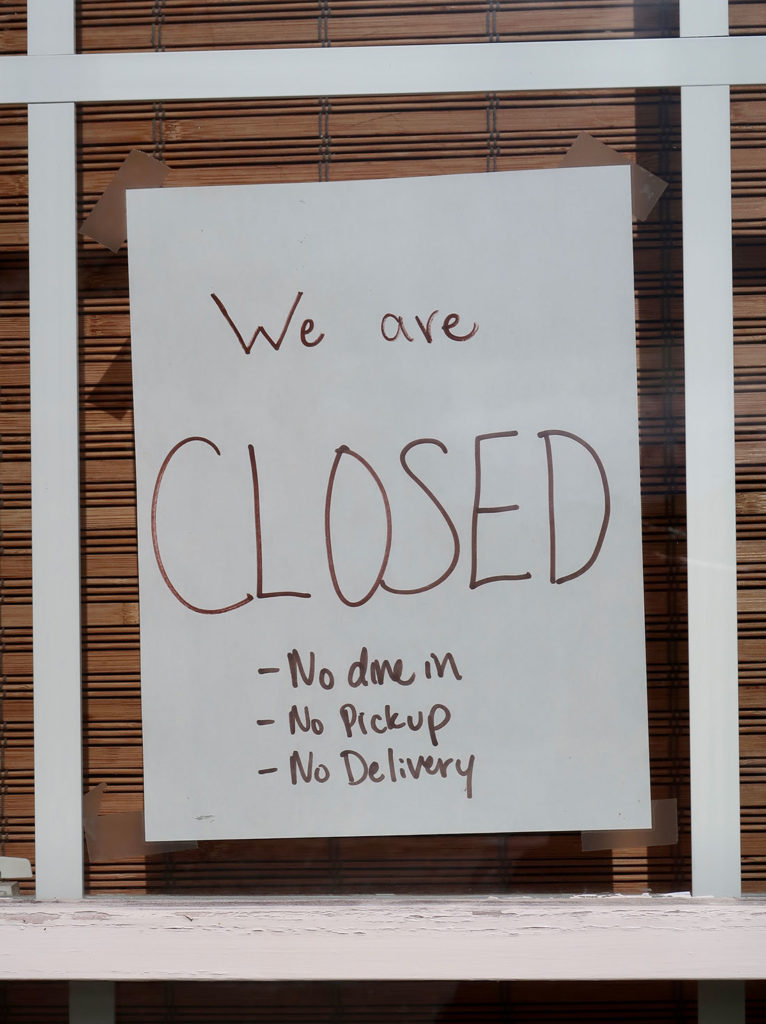These are hard times in the restaurant business.
In 2019, there were 19,000 restaurants in Georgia, according to Karen Bremer, president and CEO of the Georgia Restaurant Association. About 60% of them closed after the pandemic hit in February, 2020; about 4,000 closed for good, she said.
And for many, staying in business during the pandemic years has come at a price. “Some [owners] took a second mortgage. Some sold their homes and moved into an apartment,” Bremer said.
Here in Athens, restaurant closings have become a staple of local news as well-known and iconic restaurants wink out even as COVID seems to be waning. The world-famous vegetarian restaurant The Grit served its last meals in October. Later that month, the owners of Heirloom Cafe and Fresh Market announced in social media posts their last service would be Dec. 18. As November drew to a close, Japanese sushi restaurant Ru-San’s owner announced it would be closing to merge with another restaurant in Oconee County.
Those were just some of the latest. Last year, it was the Varsity saying goodbye. In August, Winterville’s Wok Star, a praiseworthy Chinese restaurant, shut down. “We’re closed,” says a hand-lettered sign in a Wok Star window. “No dine in. No pickup. No delivery.”

There’s no such sign at The Grill downtown on College Square, just darkness. Its doors have been shut for months after a reopening that didn’t take. It’s closed temporarily for maintenance and repair, according to The Grill’s website. There’s a “for lease” sign in what was Scoville’s Hot Chicken at the corner of Jackson and Broad Streets. Then there were Butcher and Vine and Nedza’s in Five Points, and on and on.
A 2013 article in the UGA student newspaper The Red & Black listed the “top five oldest restaurants in Athens” as The Grill, The Varsity, Taco Stand (on Milledge), New Orleans N’ Athens (formerly Harry Bissett’s New Orleans Café) and downtown’s The Mayflower, serving some of the best grits in Athens since 1948. Today only two of those are open—Taco Stand and the venerable Mayflower.
Restaurants, of course, close for many reasons or combinations of reasons which may not have anything to do with the pandemic—retirement, real estate transactions, changing tastes.
“We feel that it is time for us to focus on spending quality time with our family, who have been so supportive and understanding over the last twelve years,” wrote Heirloom’s owners, Travis Burch and Jessica Rothacker, in social media posts. Ru San’s is closing as a result of disagreement between the restaurant and its landlord, its owner explained on social media. The Varsity closing was part of a big real estate deal, with the Gordy family selling the property to Atlanta-based Fuqua Development.
One iconic restaurant’s demise was a direct and immediate result of COVID, however—downtown Broad Street’s Gyro Wrap, shuttered in 2020 but now reincarnated and reimagined under new management in a spot just around the corner on College Square. “It was just a perfect storm, all the way around,” said former Gyro Wrap owner David Carter, who’d run the place most of the time since legendary Athens restaurateur Bob Russo launched the restaurant in 1979. (The late Russo was also the founder of The Grill.)
Athens-Clarke County’s sudden March 2020 COVID shutdown orders came just as Carter was preparing to put the franchise on the market. Carter was 66, and the time for retirement had come. As COVID and fear spread in the following weeks, the possibility of selling the restaurant vanished. UGA students went home and stayed there through the summer, while other residents hunkered down at home.
Carter had no way of knowing if there would be in-person UGA classes in the fall semester, the most important time of the year for downtown restaurants and other businesses. He couldn’t get any help from the landlord, he said, and he could never get a clear explanation when he tried to find out how much financial liability he might bear if he accepted federal payroll loans and then was forced to shut down despite the help.
“I didn’t want to take the risk,” said Carter. Looking back, “I’m kind of glad I got out of the business when I did,” he said. “It would have been really hard to operate, to do that safely.”
Now the Gyro Wrap has reopened around the corner on College Square, with a different model but pretty much the original dishes, and with Carter’s blessings—he helped them get the original Gyro Wrap recipes just right. “We’ve been slammed” since opening earlier this fall, said operating partner Joey Eells.
Eells and his partner started working to reopen the restaurant soon after Carter closed it. “We felt there was a void when the Gyro Wrap closed,” Eells said.
They have worked to replicate the old Gyro Wrap’s tastes, but the way it comes to patrons is different. Instead of a server taking orders on a paper pad, the ordering and instructions to the food preparers are digital now. Customers order at the counter, or can order online through several delivery platforms.
“We created a quick-service concept,” Eells said. “People don’t have time any more. They just want to get in and out.”
With more emphasis on takeout and delivery, the restaurant needs less in-store dining space. It also helps that College Square restaurants now have outdoor dining space, thanks to the ACC Commission’s decision last year to close the block between Broad and Clayton Streets to vehicle traffic and install picnic tables.
Next year, the new Gyro Wrap will have something else the old one didn’t: an upstairs room now being transformed into an intimate wine and beer bar with a stage for live music performance. The changes reflect some trends in the restaurant industry the pandemic accelerated, according to Bremer and restaurant industry publications, like digitization, takeout and delivery, online transactions and quick service.
“The restaurant industry had to embrace technology very rapidly in order to survive,” Bremer said. “Many didn’t have websites. It was a massive effort for them.”
“The restaurants that you’d normally think of as takeout, those places managed to do quite well [during the pandemic],” said David Lynn, planning and outreach director for the Athens Downtown Development Authority. But sit-down restaurants, if they didn’t secure federal loans or didn’t figure out some creative solution like the outdoor seating area of The Last Resort Grill, “they just closed,” he said. Some downtown restaurants were also lucky enough to be located on downtown streets where street parking spaces or even part of the street itself could be converted to outdoor dining.
People are venturing out more now that the pandemic seems at last to be waning, but the restaurant industry is beset with new problems now. Labor costs are up 11–12% over the past year, and some wholesale food prices are up as much as 18%, Bremer said. “The key to everything is the labor issue. People are paying excellent wages right now but just can’t get people to work at all,” she said.
“People should understand restaurants are under a tremendous amount of economic pressure right now,” Bremer said. “If you have a favorite restaurant, you need to support that restaurant.”
Like what you just read? Support Flagpole by making a donation today. Every dollar you give helps fund our ongoing mission to provide Athens with quality, independent journalism.










